A variety of species and breeds of cows and horses (top) are penned together and are part of the unique harmony at Ol’ Mother Cluckers Farm. Above, Nicole Urban gives some attention to Bennie, an American Painted horse who roams Ol’ Mother Cluckers Farm. Below, Paul Iacavaxzi gives Teflon Don, a Standard Breed horse rescued from an Amish farm, a midday treat.
Story and photos by Rick Hiduk
(Originally published in the Susquehanna County Independent)
Nicole Urban and Paul Iacavaxzi are the sole operators of Ol’ Mother Cluckers Farm, a nonprofit farm animal sanctuary on the outskirts of Meshoppen in Wyoming County. Their love of animals has evolved through the years to focus on abused and neglected animals. They exude a sense of duty to provide a safe haven for creatures large and small and insist that the animals are just as responsible for saving them as they are for their rescue and rehabilitation efforts.
The couple also feels that they have saved each other. Though Paul and Nicole grew up relatively close to each other, they never met until accidentally striking up conversation on Facebook when Nicole thought she was talking to her former softball coach’s son, who had the same name as Paul. Nonetheless, they instantly realized that they had a lot in common, and Paul moved to the farm five years ago.
Paul is from West Scranton. While he was in junior high school, he took an interest in horses from going to visit his grandparents, Frank and Teresa Piechockie, near Nicholson. His Nana helped him get a job at Golden Eagle Stables in nearby Dalton.
There were more than 100 horses on the farm, Paul recalls, and owner Jimmy Culleton often hired teenagers to work with five or more of them at a time, including shadowing them at equine events. “If you’ve ever been up close and around horses, they are magnificent creatures,” said Paul, who was humbled and inspired by the experience. And, in his subsequent years as an over-the-road trucker, Paul saw so many beautiful farms that he wanted to have one.
Nicole is from Old Forge and moved to Meshoppen about 17 years ago simply out of a desire to live in the country. “My idea when I got this place was to get some small animals like goats and chickens,” she related. She was diagnosed with stage 4 thyroid cancer within a few months of moving into her house, but she persevered. Despite the cancer having spread to her lymph nodes, Nicole is currently in remission.
She started a bakery in her home in 2007 as a hobby, naming her business Kitty’s Kitchen after the grandmother who raised her. “I started selling to family and friends and then graduated to grocery stores during my divorce to keep my home and land,” Nicole related. She also started rescuing cats and dogs, a personal mission that continued when Paul joined her.
“We are not a dog and cat rescue though,” Nicole maintains, adding, “And we are a sanctuary – not a rescue. The animals that come here will live here for the rest of their lives.” If a beautiful view is as therapeutic for animals as it is for people, the former beasts of burden there must find the vistas of western Wyoming County to the south and Susquehanna County to the north soul-soothing.
As their compassion for needy animals grew, the couple learned of a small goat in Georgia named Oliver who, at 11 days old, was infested with giardia cysts and mites and became their first major adoption. He remains their only horned goat among a collection of long-haired silky fainting goats, Nigerian dwarf goats and pigmies. When they are healthy, Paul explained, “goats are very peaceful animals to be around.”
A more recent acquisition is a six-month old bore goat they have named Lightening Hopkins after the blues artist. He become lame after his left front leg was constricted with bailing twine. The couple thought the lower leg would have to be removed but are now hopeful that it can be saved through TLC. Kept in basement to prevent flies from getting into an open wound that Nicole treats every few hours, Lightening becomes calmer and more trusting each day.
The basement, which is continuously sanitized, is also the temporary home for a half dozen pigs, including some potbellies and a kunekunes in what Nicole calls the Golden Girls room. The next big project on the couple’s to-do list – along with finishing the chicken enclosure – is to fence in an outdoor area to adequately house the pigs, some of which need to stay separated until their temperaments are brought into check.
“When pigs are mean, they can be dangerous,” Paul noted. Part of the task of taking in an abused animal is to reduce its stress level while determining its respective path to optimum health. A Full-sized pot-bellied pig named Lexi had a terrible skin condition that was making her miserable, Paul explained. After daily applications of coconut oil, Lexi (below) has become so amicable that she may soon be able to join her porcine counterparts.
Another new resident at Ol’ Mother Cluckers is a black Standard breed horse renamed Teflon Don because of how much he has been through, including his knees blowing out. Standard breeds are unique, Paul explained, because if they blow out their knees, they can be mended.
Don was earmarked for the Shippensburg Killpen, one of many across the state and nation that hold horses for a short time before shipping them to slaughter houses in Canada or Mexico. In just over two weeks, Don was making a strong comeback and already feeling comfortable in his new environment.
Benny, an American Paint Horse with strawberry roan coloring, was rescued from the Lonestar Killpen in Texas where he was 450 pounds under his normal weight of 1,000 pounds. “When I saw Benny, there was just something about him, especially a look in his eyes,” Nicole remarked. “He had a will to live, and I had to get him.”
“He was emaciated, and his feet were in poor condition,” said veterinarian Dr. Anne DeNaple’s, who serves as the primary equine consultant for the farm. “Others were rough but not as bad as he was. I’m actually surprised that he is still alive. But Nicole put a lot of time and money into him.”
The near fully recovered Benny has become a free-range horse that wanders the farm by day, checking in on the other animals and his human caretakers before coming in by himself at sunset. Paul and Nicole have become accustomed to walking out into their garage and finding Bennie ready for a good brushing or some other attention. “He is the patriarch of the property. He naturally works animals,” Paul noted. “He’s the guard horse, and he’s quite a communicator.”
Amos (below) is a donkey that was also on the way to slaughter. He now looks over a menagerie in one of two roomy side-by-side pen with a barn at the rear and a child’s playhouse within the fenced in area. Over time, his bunk mates have included several goats, turkeys, and a rooster that used to chase children and now sometimes rests on Amos’s back. “We call him the Lord because he lets everyone come in,” Paul said of the donkey.
Paul and Nicole are deeply spiritual people who subtly sprinkle their faith into conversation about their mission and their relationships with their animals. A centerpiece on their property is a once-ailing willow tree that Nicole had transplanted a few years ago and upon which she was about to give up. While the chickens had a various places to roost, they took to the sickly willow. “They ate the bugs that were killing the tree, and it was suddenly flourishing,” said Paul. “We call it the Tree of Life now because they saved it. In return, it gives them shelter.”
Saving and second chances are hallmarks of Ol’ Mother Cluckers Farm, and the spirit of salvation is more than just a cliché. It’s palpable. The animals there seem truly happy and intermingle in surprising and charming ways, forming little cliques and looking out for each other.
“They really are doing the best that they can with most of them coming out of really rough conditions,” Dr. DeNaples, who has been visiting the farm for a little over a year, remarked. “The housing conditions are definitely above adequate, and every time that I go there, they are improving it.
But the couple noted, when you take on an animal, you also take on its vet bills. Most of the animals on the farm and certainly all of the larger ones required sponsors to transport them to Meshoppen and provide eternal care. The Ol’ Mother Cluckers Farm Facebook page garners new fans and followers every day and is the primary avenue for Nicole to coordinate financial support for their efforts.
Much of the financial assistance they have received over the past year has come from older social media users. “Through the internet, they get to experience the animal they sponsor and a farm life they have never had,” Paul suggested. Personal visits to the farm are welcome and can be arranged in advance.
Nicole routinely monitors Facebook for SOS requests for animals that need their help immediately and turns them into posts geared to solicit sponsors.
“We don’t get a lot of time to plan. There’s a lot of improvisation in this,” said Paul, who refers to their clever repurposing of discarded materials into temporary animal housing as “mountain ingenuity.” The goats love donated children’s play houses, and the couple hopes to acquire a few more. “It’s amazing what people throw away that we can use,” Paul added. A donated horse trailer has also been a big help to them.
“They are beginners, but they have learned a lot,” DeNaples related. “They take very good care of the animals and they do most of the work themselves.”
The couple has some great ideas for increasing awareness and support by hosting events to engage guests with the animals, such as Tea With Goats, educational outings for school children, a petting zoo, and working farm experiences with camping options. But there are only so many minutes in a day and so many days in a week.
Despite their own health issues, Paul and Nicole are constantly on the move.
Nicole insists that the never-ending needs of the animals eclipses the ups and downs in their personal lives. “They get us up in the morning,” she stated.
“And they still have a lot to offer,” said Paul.
To volunteer at Ol’ Mother Cluckers Farm or provide other assistance, interested readers may contact Nicole via Facebook, by phone at 570-240-1335, or by email at nicjon30@aol.com.
Docile turkeys Thomas and Teresa escape the heat of the day under a willow tree their chicken friends helped to rescue.
A trio of ducks file past the “Tree of Life.”
A horse named Teeny Spot was born with a dwarfism gene that made her unbreedable and thereby worthless to her former owners. Now she has a comfortable home and good friends like goat pals Oliver and Chloe.
One of the next projects on tap is to fence in a chicken village that offers a variety of habitat.
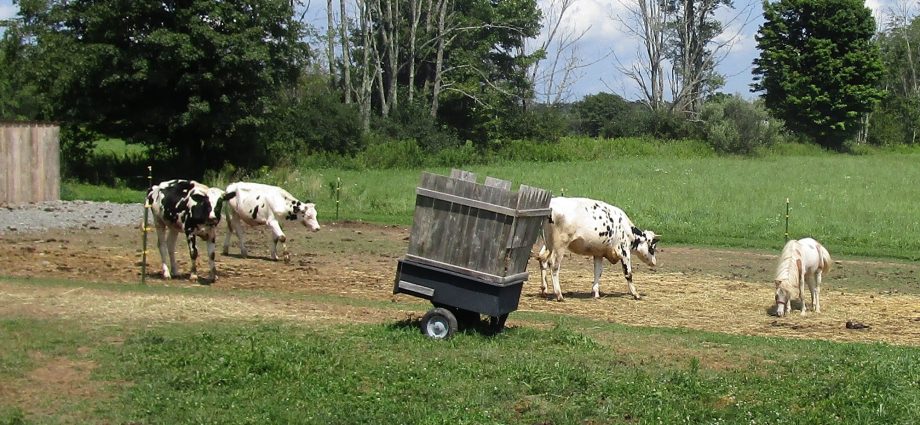
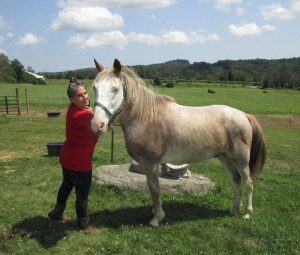
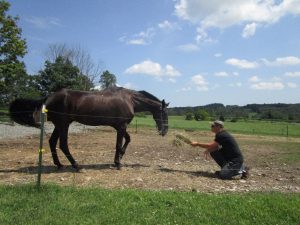
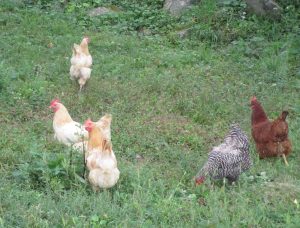
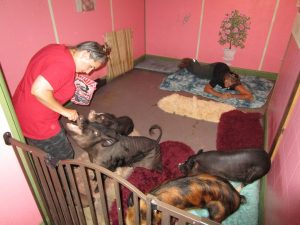
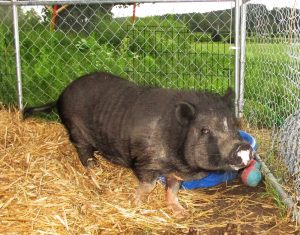
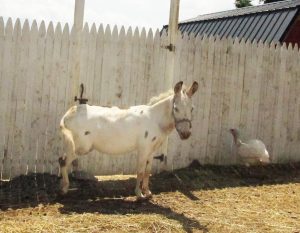
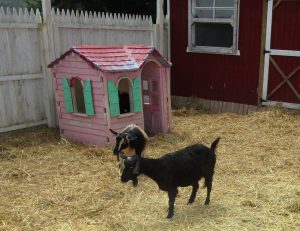
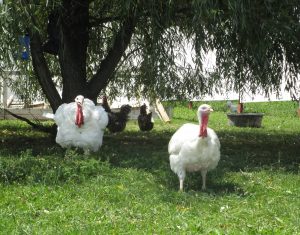
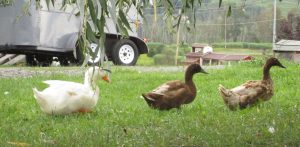
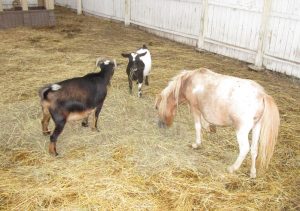
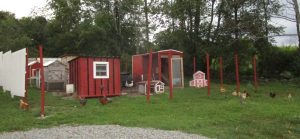
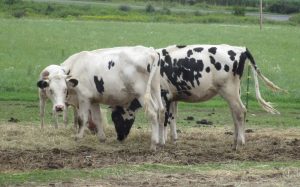
Paul and Nicole You have done wonders with these animals. I know the work you both put in. You are two of the gentilest people i know. I wish I could come and experience all of it. Im not driving yet I hope soon. Love to you both my Darlings. Call if you need anything. Love Mom and Dad I.